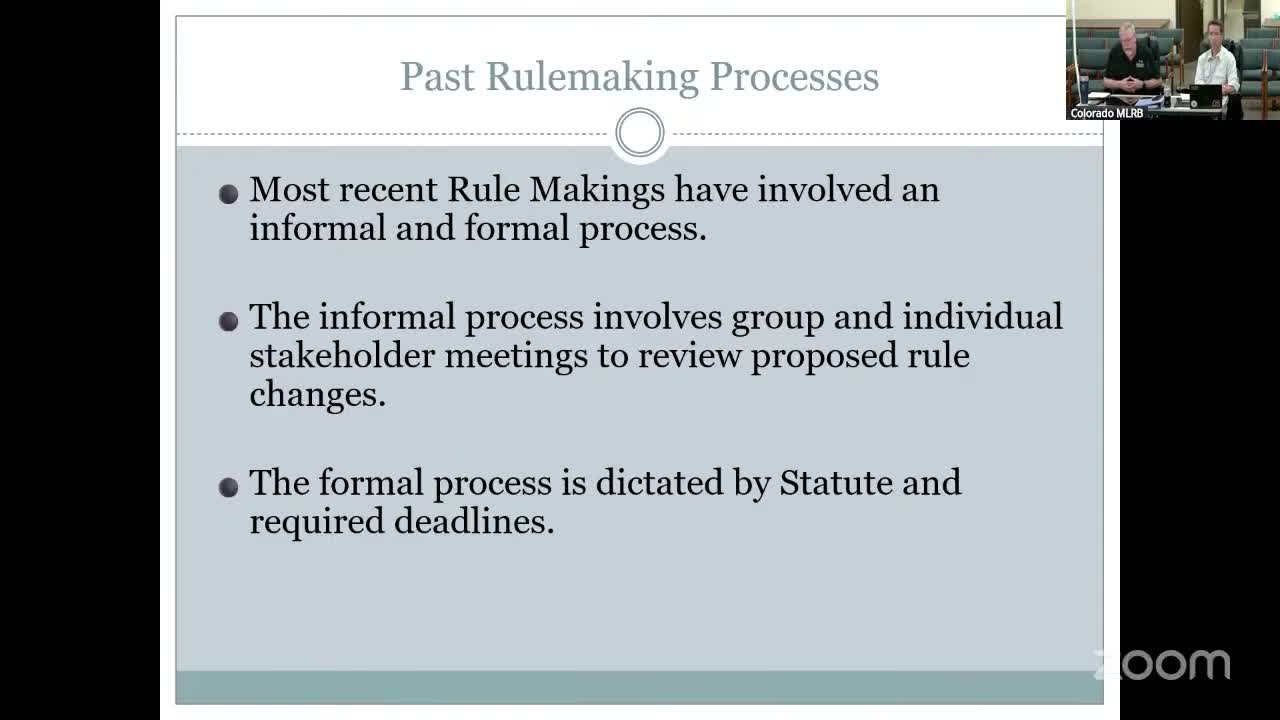Stakeholders kick off Colorado rulemaking process for construction materials and hard rock
June 26, 2025 | Mined Land Reclamation Board, Governor's Boards and Commissions, Organizations, Executive, Colorado
This article was created by AI summarizing key points discussed. AI makes mistakes, so for full details and context, please refer to the video of the full meeting. Please report any errors so we can fix them. Report an error »

In a recent informal stakeholder meeting held in Colorado, discussions centered around the proposed rule changes and the process for stakeholder engagement. The meeting aimed to establish a collaborative environment where stakeholders could review, discuss, and potentially amend the proposed rules before they enter the formal legislative process.
The informal process is designed to facilitate open dialogue among various stakeholders, allowing for the identification of concerns and the opportunity to make necessary edits. A tentative schedule for these informal meetings has been established, with sessions planned for the fourth Wednesday of each month from now until October. The meetings will focus on specific topics, including construction materials and hard rock regulations, culminating in a final combined meeting on October 22 to discuss the drafts.
The goal of this informal engagement is to reach consensus among stakeholders, which will streamline the transition into the formal rule-making process. Following the informal meetings, the final drafts are expected to be ready for presentation to the board by December. This timeline aligns with statutory requirements, which dictate that rule-making hearings cannot occur until at least 20 days after the publication of the proposed rules in the Colorado Register.
The formal rule-making process is anticipated to begin in early 2026, with additional stakeholder meetings scheduled for January and February. These meetings will precede board meetings to ensure that all concerns are addressed before the formal hearings. The tentative timeline for rule-making is set for March for construction materials and April for hard rock, although these dates may be adjusted based on stakeholder feedback and readiness.
Overall, the informal stakeholder meetings represent a proactive approach to regulatory changes, emphasizing collaboration and transparency. As the process unfolds, stakeholders will have the opportunity to influence the final rules, ensuring that diverse perspectives are considered in the decision-making process.
The informal process is designed to facilitate open dialogue among various stakeholders, allowing for the identification of concerns and the opportunity to make necessary edits. A tentative schedule for these informal meetings has been established, with sessions planned for the fourth Wednesday of each month from now until October. The meetings will focus on specific topics, including construction materials and hard rock regulations, culminating in a final combined meeting on October 22 to discuss the drafts.
The goal of this informal engagement is to reach consensus among stakeholders, which will streamline the transition into the formal rule-making process. Following the informal meetings, the final drafts are expected to be ready for presentation to the board by December. This timeline aligns with statutory requirements, which dictate that rule-making hearings cannot occur until at least 20 days after the publication of the proposed rules in the Colorado Register.
The formal rule-making process is anticipated to begin in early 2026, with additional stakeholder meetings scheduled for January and February. These meetings will precede board meetings to ensure that all concerns are addressed before the formal hearings. The tentative timeline for rule-making is set for March for construction materials and April for hard rock, although these dates may be adjusted based on stakeholder feedback and readiness.
Overall, the informal stakeholder meetings represent a proactive approach to regulatory changes, emphasizing collaboration and transparency. As the process unfolds, stakeholders will have the opportunity to influence the final rules, ensuring that diverse perspectives are considered in the decision-making process.
View full meeting
This article is based on a recent meeting—watch the full video and explore the complete transcript for deeper insights into the discussion.
View full meeting
